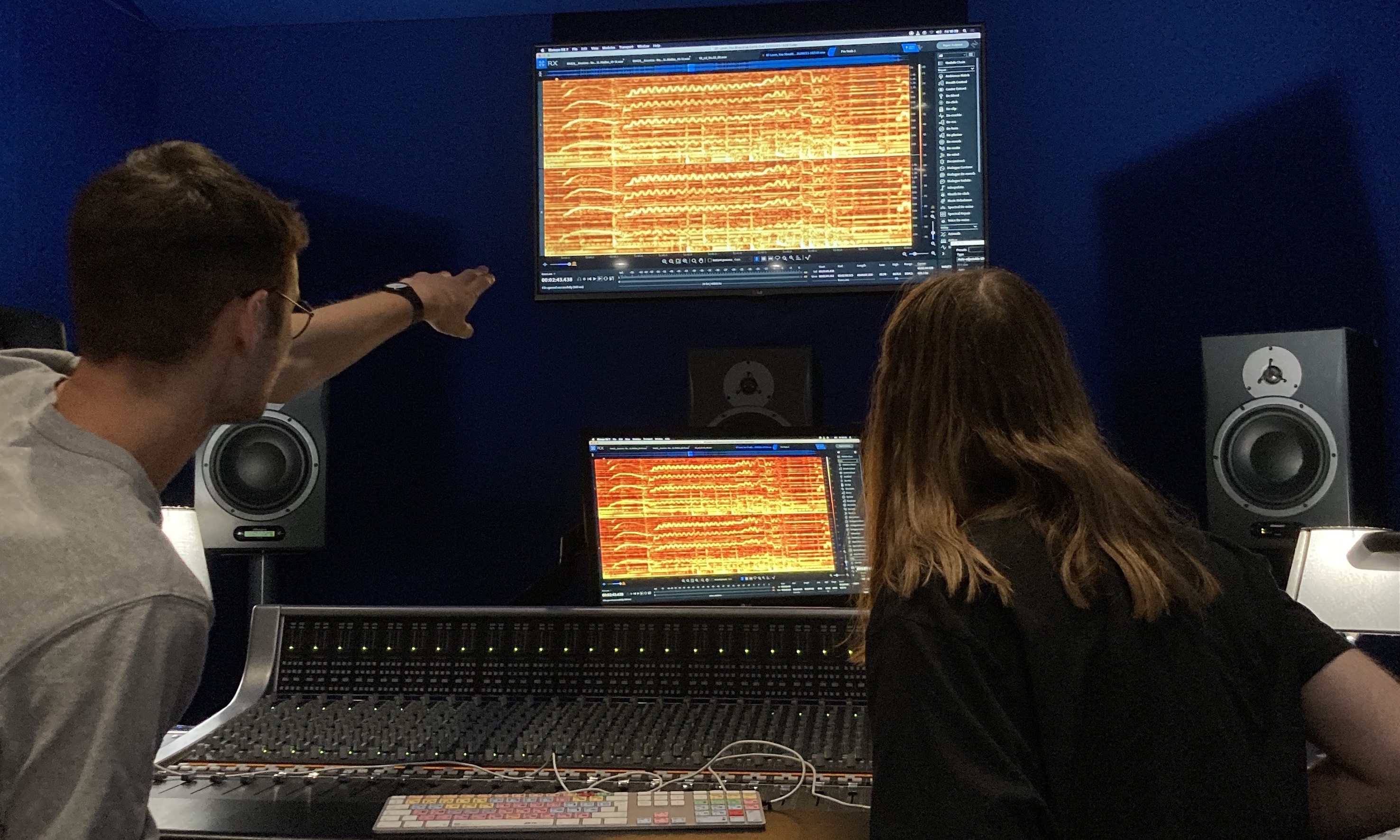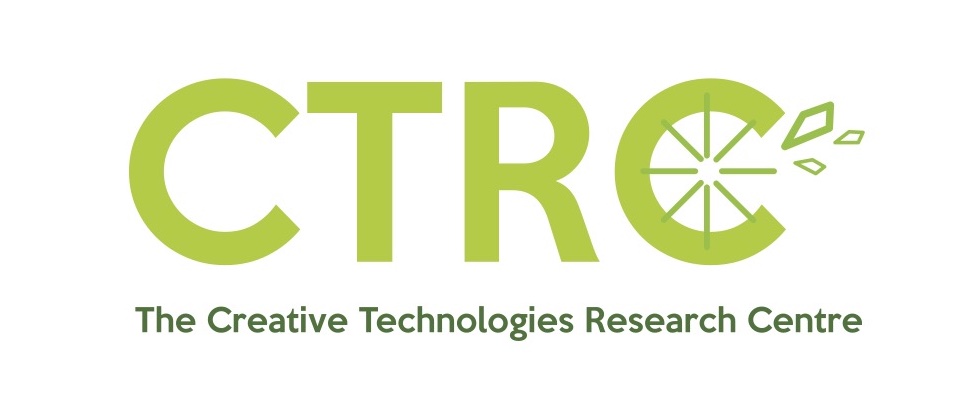Search our site...
Search module

Creative Technologies Research Centre
Based at the School of Arts and Creative Industries, the Creative Technologies Research Centre (CTRC) gathers researchers at London South Bank University to engage in multiple approaches to further our knowledge and understanding of post-digital human-machine creative relationships within their technologised audio-visual architectures.
Our members are clustered within a set of research groups to engage in areas such as game studies and development, immersive sound design, music studies, film making, screen studies, virtual media production, cultural studies, and creative industries. Supported by excellent studio facilities, including Elephant Studios at the heart of London and Hi3 at Maidstone, we nurture and maintain research excellence in a fluidly developing field of interdisciplinary and trans-disciplinary research, bringing together real-world and virtual research to achieve new insights and innovative work within a collaborative atmosphere.
Games Research Group
The Game Research Group seeks to foster excellence in games research, with members of the GRG engaging in research areas including: The History of Video Games, Crediting Practices, Crossover technologies and Connected Industries, Virtual and Augmented Reality, Game Audio, Sensory Design, Body-oriented Design, Haptics, Biomechanics, Biometrics, Video Game Industry Studies (policy and management), Games and health, Accessibility, Gender and games, Game curriculum development design and teaching and Esports, as well as Sound and Music in Games.
Researching the Screen
The Researching the Screen group engage in research praxis in the areas of Documentary, Fiction Film, Television, and Artist Moving Image. The group members publish on issues that include the portrait film, gender and filmmaking, affect, documentary interiority, community filmmaking, cinematography and race, Weimar cinema and culture. Group members have screened work internationally at film festivals such as London Film Festival, Locarno Film Festival, Aesthetical, Alchemy Film and Moving Image Festival, London Short Film Festival, and more.
Sonic Research Group
The Sonic Research Group brings together academic staff and postgraduate research students from across the University who are engaged in the concepts, cultures, creative practices and technologies of sound and music. Members of the SRG engage in research including the following areas: immersive audio; dancefloor sound; computer music; sound art; modular synthesis. Public events include concerts, listening sessions and film screenings, as well as panel discussions with guests, such as Atau Tanaka, Kaffe Matthews and Maria Chavez.
Co-Directors
- Prof Lizzie Jackson
- Prof Hillegonda C Rietveld
Games Research Group
- Andy Lemon (Lead)
- Alan Lewis
- Mark Simpson
- Rory Summerley
Researching the Screen
- Dr Matthew Hawkins (Lead)
- Adam Brown
- Lucy Brown
- Ricardo Domizio
- Christiane Hitzemann
- Dr Iris Luppa
- Benjamin Mallaby
- Stefania Marangoni
- Joshua Magor
- Meloni Poole
- Yu-Lun Sung
- Dr Patrick Tarrant
Sonic Research Group
- Dr Adam Parkinson (Lead)
- Dr Tahera Aziz
- Dr Guy Baron
- Chris Elliot
- Dr Kevin Milburn
- Justin Randell
Fashion Marketing
- Tony Charalambous
- Helen Powell
- Mirsini Trigoni
Postgraduate Researchers
- Ben Clarke
- Graham Dunning
- L.J. Filotrani
- Faria Hossain
- Ben Mallaby
- Paramita U. Santoso
- Elonka L. Soros
Selected publications
Brown, L. (2021) Memory, Gender and Filmmaking: Exploring Thelma & Louise. Viewfinder. (118). https://doi.org/2634-8179
Domizio, R. (2020). Digital Affect and the Microbiological in Maxì Dejoie’s The Gerber Syndrome: il contagio and Alex Infascelli’s H2Odio. Simultanea: Journal of Italian Media and Popular Culture. http://italianpopculture.org/digital-affect-and-the-microbiological-in-maxi-dejoies-the-gerber-syndrome-il-contagio-and-alex-infascellis-h2odio/
Hawkins, M. & Hawkins, M. (2021). Antigone in the London office: Documentary Film, Creativity and Female Agency. Cultural Studies. 36 (1). https://doi.org/10.1080/09502386.2021.2011930
Jackson, L. (2020). Datafication, Fluidity, and Organisational Change: Towards A Universal ‘PSM 3.0’. in: Medina, M., Savage, P. & Lowe, G.F. (ed.) Universalism in Public Service Media. Gothenburg: Nordicom.
Jackson, L. (2019) Models of Co-working in the Downtown Toronto Innovation Districts. in: Creating Creative Clusters: Innovation, Governance and Production. Brussels: Taylor & Francis.
Jackson, L. & Glowacki, M. (2019). Observing High Technology Firms and Creative Audiences. in: Van den Bulck, H, Puppis, M, Donders, K & Van Audenhoven, L (ed.) The Palgrave Handbook of Methods for Media Policy Research. London and New York: Palgrave Macmillan.
Lemon, A. & Rietveld, H.C. (2021). Female Credit: Excavating Acknowledgement for the Capcom Sound Team. in: Fritsch, M. and Summers, T. (eds.) Cambridge Companion to Video Game Music. Cambridge: Cambridge University Press.
Lemon, A. & Rietveld, H.C. (2019). The Street Fighter Lady: Invisibility and Gender in Game Composition. ToDiGRA Journal. 5 (1). https://doi.org/10.26503/todigra.v5i1.112
Parkinson, A., Tahirglu, K., Magnusson, T., Garrelfs, I. & Tanaka, A. (2020). Digital Musical Instruments as Probes: How Computation Changes the Mode-of-Being of Musical Instruments. Organised Sound. 25 (1), pp. 64-74. https://doi.org/10.1017/S1355771819000475
Rietveld, H.C. & Fritsch, M. (eds) (2023), ‘Special Issue: Synergies Between Game Music and Electronic Dance Music in Cultural Context, Journal of Sound and Music in Video Games 4(1). https://online.ucpress.edu/jsmg/issue/4/1
Rietveld, H.C. (2022). The Nightclub. Stahl, G. and Percival, J. M. (ed.) The Bloomsbury Handbook of Popular Music, Space and Place. London and New York: Bloomsbury Academic.
Rietveld, H.C. & Monroe, A. (2021). Gabber: Raising Hell in Technoculture. Metal Music Studies. 7 (3), pp. 399-421. https://doi.org/10.1386/mms_00057_1
Rietveld, H.C. & Kolioulis, A. (2018). Detroit: Techno City. in: Lashua, B, Wagg, S, Spracklen, K and Yavuz, MS (.) Sounds and the City: Volume 2. New York and London: Palgrave Macmillan.
Rietveld, H.C. (2018) Machine Possession: Dancing to Repetitive Beats. Levaux, C. & Julien, O. (Eds) Over and Over: Exploring Repetition in Popular Music. New York: Bloomsbury Academic. 75-88
Rietveld, H.C. (2018) Dancing in the Technoculture. Emmerson, S. (Ed) The Routledge Research Companion to Electronic Music: Reaching out with Technology. London and New York: Routledge. 113-134
Rietveld, H.C. & Henriques, J. (2018) Echo. Bull, B. (Ed) Routledge Companion to Sound Studies. London and New York: Routledge. 275-282
Sung, Y. (2020). Reading the Light Right: The Exposure of Asian Skin Tones in Cinematography. Frames Cinema Journal. 17. https://doi.org/10.15664/fcj.v0i17.2075
Tarrant, P.A. (2018). The Serial Portrait and Coeval Time on the Cable Car Up Manakamana Mountain. New Cinemas: Journal of Contemporary Film. 15 (1). https://doi.org/10.1386/ncin.15.1.49_1
Tarrant, PA (2016). Reading the Morphology of Ben Rivers’s Chemical Landscapes. Moving Image Review & Art Journal (MIRAJ). 5 (1-2), pp. 58 - 69 (11). https://doi.org/10.1386/miraj.5.1-2.58_1
Selected Films
Brown, L (2021) BFF Thelma & Louise: Tanya & Lucy Revisit 30 Years On. https://learningonscreen.ac.uk/viewfinder/articles/bff-thelma-louise-tanya-lucy-revisit-30-years-on/
Poole, M. (2022 - in production) Certain. https://meloni-poole.squarespace.com/#/certain-1/
Hawkins, M (2020) Husband and Wife. https://vimeo.com/473103589/75608496ea
Tarrant, P. (2022) Crows Film. https://bowarts.org/event/visions-2022-programme-1/
Tarrant, P (2022) How to Microwave a Cauliflower (in three easy steps). https://www.lightmatterfilmfestival.com/program1
Tarrant, P. (2021) Mandatory Training. https://patricktarrant.com/mandatory/training.htm
Selected Recordings
Lemon, A. (2022) EP1 (EP, by NE7): compositions constructed entirely out of single cycle hand drawn chip waveforms in Open Mod Plug Tracker. (UK) https://ne77en.bandcamp.com/album/ep-1
Parkinson, A. (2022) Blue Forty-Six (Album, by Dane Law): algorithmic improvisation and interrogation of the musical affordances of the laptop. Blue Tapes (UK) https://bluetapes.bandcamp.com/album/blue-forty-six
Parkinson, A. (2020). Algorithmic Music for Synthesised Strings. Astral Plane Recordings (US). https://thedanelaw.bandcamp.com/album/algorithmic-music-for-synthesised-strings
Selected Postgraduate Research Theses
Baron, G. (2021). Post-Euphoria in Electronic Music Making. PhD Thesis. London South Bank University. School of Arts and Creative Industries https://doi.org/10.18744/lsbu.8yyz7
Campos Valverde, R. (2019). Understanding Musicking on Social Media: Music Sharing, Sociality and Citizenship. PhD Thesis. London South Bank University. School of Arts and Creative Industries. https://doi.org/10.18744/lsbu.88x09
Hawkins, M (2018). The Concept of Affective Tonality, and the Role of the Senses in Producing a Cinematic Narrative. PhD Thesis. University of East London. School of Arts and Digital Industries. https://doi.org/10.15123/PUB.7627
Kimmich, MD (2016). Emotional Culture? An Investigation into the Emotional Coverage of Televised Leader Debates in Newspapers and Twitter. PhD Thesis London South Bank University. School of Arts and Creative Industries. https://doi.org/10.18744/PUB.001801
Popperwell, A. (2021) Resounding 18th Century Copped Hall. MRes Thesis. London South Bank University. School of Arts and Creative Industries.
Zouli, I (2018). Digital Tate: the use of video and the construction of audiences. PhD Thesis London South Bank University. School of Arts and Creative Industries. https://doi.org/10.18744/PUB.002751
Hi3 Network: (2020-2023)
- Programme: https://www.southbankinnovation.co.uk/programmes/hi3
- Maidstone Studios: https://www.maidstonestudios.com/hi3-network/
- Digital Hub, Screen South, Folkstone: https://screensouth.org/hi3-network/
- Canterbury: https://www.canterbury.ac.uk/research/hi3-network
ACE-IT: (2019-2022)
- ACE-IT: https://www.sbi.business/aceit/home
- London College of Communication, UAL: https://www.arts.ac.uk/colleges/london-college-of-communication
CTRC Public Speaker Programme
Robert Strachan, Creative Technology Affordances in Music Making
Thursday 30 March 2023, 5PM BST
Chelsea Lecture Theatre, Hub, LSBU, 116 London Road, London, SE1 6NJ
VP Green Symposia
VP Green 2 - March 10th 2023
Organised by Final Pixel with Breda University of Applied Sciences (Netherlands), CTRC (UK), and Workflowers (France), , this half-day symposium explores the state of sustainability in Virtual Production Practices within the Creative Industries. The event continues the conversation from the inaugural event held at the University of Greenwich in 2022, taking those findings from the co-design session and panel discussion and implement them into a dedicated research study.
Watch proceedings: https://youtu.be/iTY34Flt3ZM
VP Green 1 - May 20th 2022
Watch proceedings from University of Greenwich (start at 1.20.18): https://www.youtube.com/live/Tl-wBIQhIBk
Livestream of Emission Impossible symposium at University of Greenwich, London, Friday 20th May 2022. .... The University of Greenwich, London, is hosting a one-day symposium (unconference) on Friday, May 20th ..., exploring the state of sustainability in Virtual Production (VP) practices within the Creative Industries. Industry speakers, panels, co-design workshops, and lively debate, with the aim of creating a roadmap for novel research into sustainable VP film-making will help film-makers, producers, broadcasters, studios, and advertising agencies make the best ecological decisions for their productions and clients – walking the line between providing the highest quality film output at the lowest cost the planet.
Over the last decade the number of films being made about climate change has sky-rocketed, but is the film industry’s own house on fire? Tent-pole films release almost 3000 tons of carbon dioxide into the atmosphere, with US films in total releasing 15 million tons each year. When COVID19 hit, the move to VP was swift and is now the fastest growing sector in the industry; growing as fast in 2020 as it had been predicted to across the entire decade. Valued at $1.6B in 2021, the VP market is expected to grow by almost 20% by 2030, with many advertisers and studios committed to moving 70% of their production pipeline to VP over the next two years. Using LED technology, VP mitigates much of the environmental costs of traditional film-making by reducing transport and location fuel usage. But is it the panacea the industry hopes for? Or will the ecological costs of new soundstages and mass data transfer wipe out the potential gains?
